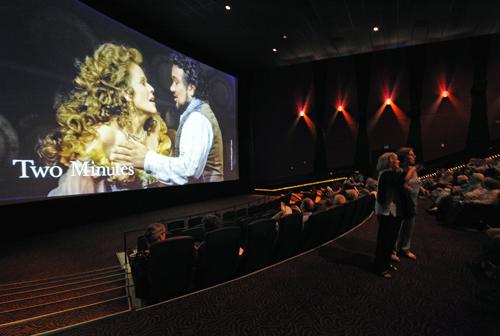Screenings of live events now popular at cinemas

Opera fans inside the AMC Burbank 16 theater in Burbank, Calif., Monday, Sept. 22, 2008, watch The Metropolitan Opera during opening night as it is transmitted by satellite from New York. Kevork Djansezian, The Associated Press
Oct 3, 2008
BURBANK, Calif. – As the house lights dim and the maestro lifts his arms, a hush comes over the crowd. It’s opening night at The Metropolitan Opera – only we’re 2,800 miles away.
Retiree Ellen Gifford sits with popcorn and a soda inside the AMC Burbank 16 theater. For $22 a ticket, she doesn’t need to wear an evening gown, pay hundreds for a seat “in the boonies” or fly to New York to take part.
“Don’t get me wrong, I love the atmosphere of the real opera,” she says. “(But) it’s out of reach financially.”
Like Gifford, growing numbers of showgoers are foregoing the stage for local movie screens that are outfitted to present video transmitted by satellite. Producers are gaining new audiences at very low cost, and theater owners are filling seats at off hours.
“It’s the next best thing to the live performance,” said Rory Bruer, president of Sony Pictures Releasing, which screened Cirque du Soleil’s “Delirium” traveling show nationwide in August and the Broadway musical “Rent” in September.
Get The Daily Illini in your inbox!
“You’re able to feel you’re a part of the show in a way.”
Sony markets its new “Hot Ticket” business as a second-best alternative to attending live events with the tagline: “If you can’t be there, be here.”
Sales for the offbeat entertainment option are growing.
National CineMedia Inc., a joint venture that handles pre-roll ads for several movie theater companies, boosted the number of special-event screenings from 15 in 2005 to 39 this year. The Met’s live showings went from eight in about 350 U.S. theaters last year to 11 shows in 466 theaters this season.
Its 15,000-screen network has shown such fare as a live panel on the national debt and deficits with billionaire Warren Buffett, concerts by Celine Dion and Garth Brooks and even marching band competitions.
Dedham, Mass.-based National Amusements Inc. has presented live transmissions since 2003, including Boston Red Sox, Boston Celtics and college football games and other events. It signed on for the entire Met season this year.
Access Integrated Technologies Inc., of Morristown, N.J., also plans to host 25 special event screenings this year, among them four shows by the San Francisco Opera this past spring.
The screenings help theater owners sell seats, popcorn and candy at slow times like midweek nights and during the day on Saturdays and Sundays.
“Over the course of a year, it’s substantial,” said Dick Westerling, spokesman for Regal Entertainment Group, co-founder of National CineMedia. “We’re very pleased with the success.”
National CineMedia saw its revenue from special-event screenings double to $7 million for the quarter from April to June compared to last year.
The events remain low-profile. There was no opera poster outside the AMC, and the listing at the ticket booth said, inscrutably, “Open Night.” But loyal fans still showed up an hour ahead of time and nearly filled the 294-seat house.
Only a dozen or so screenings of live shows and events are set nationwide through December, but Sony’s entry into the arena vindicates the business model and raises awareness, said Kurt Hall, National CineMedia’s chief executive.
“The attention that the studios will get is good for everybody,” he said. “All boats rise, if you will.”
The low cost of satellite transmissions means a wide variety of content creators can reach new audiences across the country.
Director Jon Dunham said he likely saved thousands of dollars on film printing costs when his “Spirit of the Marathon” documentary aired on National CineMedia’s digital network twice this year.
The screenings – to which one Maine group jogged 130 miles by relay on a cold January night – grossed just $1 million, but it was enough.
“There’s no question that it will be profitable … once we’re into the DVDs,” Dunham said. “That’s really something for a truly independent documentary.”
And about 1.2 million people are expected to see The Met on movie screens this season, up from 935,000 last year, while revenue is expected to surpass last season’s $18 million gross.
Some people seem to prefer viewing events in a crowded venue, rather than at home in front of the TV.
Fans at the opera screening react as if they’re in Lincoln Center. They stand to sing “The Star-Spangled Banner” before the show and applaud every aria.
“Magnificent,” says Matt Sharp, a 34-year-old community organizer, during an intermission after Renee Fleming belts out Act 2 of “La Traviata.” “It’s opera for the 21st century.”





